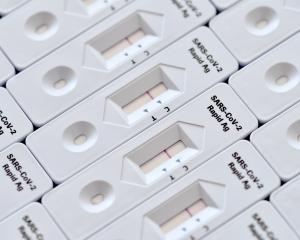A judge has ordered an 11-year-old boy to be vaccinated against Covid-19 after his parents disagreed over whether he should get the jab.

While experts say it's not likely to set a precedent, it has triggered warnings for parents to think about their child's greater wellbeing before heading to court and putting them in a situation where they feel conflicted about siding with one parent over another.
The boy told Judge Dominic Flatley that while he wasn't opposed to getting vaccinated he would prefer to wait until he was 12 or 13.
In a decision from the Dunedin Family Court released yesterday, Flatley said the boy was "caught between his two parents" and believed he was trying to "please both".
"He is clearly not opposed to being vaccinated. That is the bottom line."
The boy's parents went to court early this year after the mother wanted her son vaccinated before he started school in February. She was concerned for her son's welfare because he had asthma and was worried he would be ostracised at school if he wasn't vaccinated.
His father disagreed, saying he didn't believe it was safe and opposed the idea of being vaccinated by direction – or mandate. He instead wanted his son to be able to make his own decision, believing he didn't want to be vaccinated but might do later in the future.
Before making his decision Judge Flatley met with the boy, who said he would prefer to wait until he was 13 to receive the vaccination.
"When I discussed that with him he was not able to tell me why."
"He talked about being able to get some more information maybe by way of looking online and talking to other people who had had the vaccination. He referred to this as research."
"I am not wishing to be critical of [him] in any way, but that does not amount to proper research and would not provide him with information that he could rely on in order to make the most informed decision in his best interests."
"He is clearly not opposed to being vaccinated. That is the bottom line."
Flatley said in the decision, dated January 31, that he couldn't see any reason why the child shouldn't be vaccinated and that it was in his best interests to do so.
"He will be able to engage in all of the school activities available. He will also be better protected as far as his health is concerned, particularly having regard to the fact that he has asthma, and he will not put his mother or grandparents or any other family member at risk with all of the associated limitations and consequences."
"In short, vaccination provides the best protection from transmission, infection, illness, hospitalisation and death and that should be available to him."
He added the vaccine had been professionally developed and tested, was heavily advised by the Government and the World Health Organisation and was scientifically proven to reduce the effects of the virus.
After looking at all the evidence and submissions, the judge said he could not see any reason why the boy should not be vaccinated and directed that he receive it immediately, ideally that day if possible.
The decision comes after a similar case in Whakatāne where a 12-year-old boy was caught between two parents with opposing views on the vaccine.
However, in that case, the judge ordered the boy, who didn't want to be vaccinated, be allowed to make his own mind up.
Recently retired Family Court lawyer Gareth Bogle said he didn't think the decision would be precedent-setting as parents with opposing views about immunisations was "depressingly common" and he'd seen similar incidents over the course of his 20-year career.
"But because it's the Family Court there's a higher level of privacy and you just don't hear about it."
"I have a prevailing sense of sadness about a little kid being involved in this...it highlights an issue that's going on for a lot of kids, they're either torn between the two parents or their parents are united against the vaccine and the kid misses out on opportunities."
University of Otago bioethicist Janine Winters said dragging a child to court over the vaccine was probably more damaging than any Covid or vaccine-related consequences.
"A Covid jab is a low-risk decision. Both risks in either way are extremely small, compared for example to parents who disagree about giving their child chemotherapy for cancer…which is a much-more imminent and high-risk decision."
"This is not the hill I would die on, personally."
Dr Jin Russell, a community and developmental paediatrician at the University of Auckland, said it wasn't surprising there would be differences in opinion between parents.
"But I would hope that if the child is old enough the child's own views are taken into account."
She said the vaccine was not mandatory for children, but the medical profession was overwhelmingly in favour of children - especially those with pre-existing conditions - receiving it.
The Prime Minister, the Children's Commissioner and Human Rights Commissioner all declined to comment on the decision.
- Jeremy Wilkinson
Advertisement













